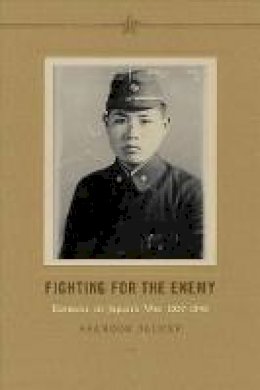
Stock image for illustration purposes only - book cover, edition or condition may vary.
Fighting for the Enemy
Brandon Palmer
€ 46.75
FREE Delivery in Ireland
Description for Fighting for the Enemy
Paperback. An extended, objective analysis of the exploitation of the thousands of young Korean men who served in Japan's military and auxiliary occupations Num Pages: 272 pages, black & white illustrations, black & white tables. BIC Classification: 1FPJ; 1FPK; 3JJH; GTB; HBJF; HBLW; HBWQ. Category: (P) Professional & Vocational. Dimension: 226 x 150 x 18. Weight in Grams: 363.
Fighting for the Enemy explores the participation of Koreans in the Japanese military and supporting industries before and during World War II, first through voluntary enlistment and eventually through conscription. Contrary to popular belief among Korean nationalists, this involvement was not entirely coerced. Brandon Palmer examines this ambiguous situation in the context of Japan's long-term colonial effort to assimilate Koreans into Japanese sociopolitical life and documents the many ways Koreans-short of openly resisting-avoided full cooperation with Japanese war efforts. Much media attention has been given to Japan's exploitation of comfort women in Korea and elsewhere in East Asia during the colonial period, but, until now, there has been no extended, objective analysis of the exploitation of the thousands of young Korean men who served in Japan's military and auxiliary occupations.
Product Details
Publisher
University of Washington Press United States
Number of pages
272
Format
Paperback
Publication date
2013
Series
Korean Studies of the Henry M. Jackson School of International Studies
Condition
New
Weight
362g
Number of Pages
272
Place of Publication
Seattle, United States
ISBN
9780295992587
SKU
V9780295992587
Shipping Time
Usually ships in 7 to 11 working days
Ref
99-1
About Brandon Palmer
Brandon Palmer is associate professor of history at Carolina Coastal University in Conway, South Carolina.
Reviews for Fighting for the Enemy
Brandon Palmer's study manages to achieve the often sought-after combination of brevity, readability, and greater historical awareness. . . . [A] fascinating, objective look at the experience of Korean men during the Second World War. Fighting for the Enemy does not set out to be an end-all history of colonial Korea, but anyone who wishes to study the period would be remiss if it wasn't part of his or her collection.
Evan T. Daniels
Korean Studies
[B]alanced, exhaustive, and textured....Palmer's work must be placed with T. Fujitani's Race for Empire as one of the two most important works on the subject in the English-language literature on the war period in Korea. It will certainly stand as the platform from which further study of the late colonial period will evolve.
Michael E. Robinson
Journal of Japanese Studies
Palmer's study is long overdue in addressing Japan's colonial policy and how the exigencies of war forced Tokyo to revise its initial policies for a people they long considered to be inferior. . . . [This book is] Essential.
CHOICE
Palmer's study is long overdue in addressing Japan's colonial policy and how the exigencies of war forced Tokyo to revise its initial policies for a people they long considered to be inferior. A must for any library seeking to upgrade its collection on the Pacific War.
Choice
Evan T. Daniels
Korean Studies
[B]alanced, exhaustive, and textured....Palmer's work must be placed with T. Fujitani's Race for Empire as one of the two most important works on the subject in the English-language literature on the war period in Korea. It will certainly stand as the platform from which further study of the late colonial period will evolve.
Michael E. Robinson
Journal of Japanese Studies
Palmer's study is long overdue in addressing Japan's colonial policy and how the exigencies of war forced Tokyo to revise its initial policies for a people they long considered to be inferior. . . . [This book is] Essential.
CHOICE
Palmer's study is long overdue in addressing Japan's colonial policy and how the exigencies of war forced Tokyo to revise its initial policies for a people they long considered to be inferior. A must for any library seeking to upgrade its collection on the Pacific War.
Choice
